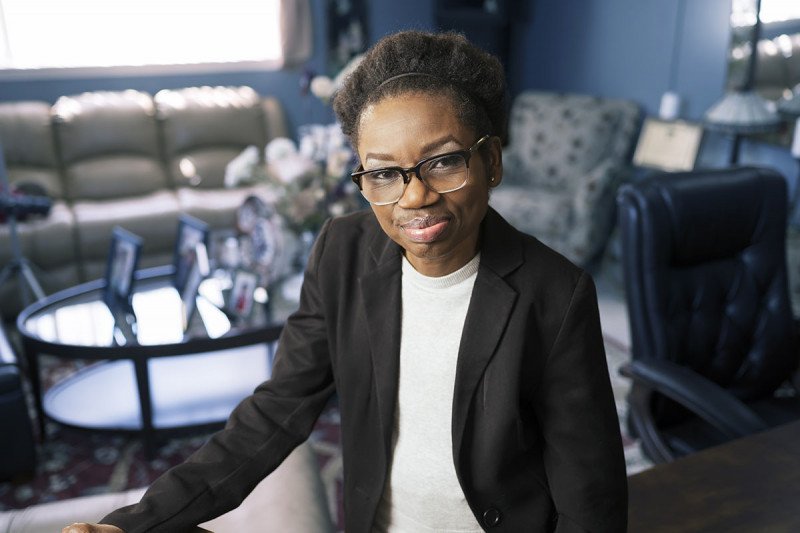
The moment she was diagnosed with breast cancer at age 55, Brooklyn resident Debra E. Edwards felt a combination of fear and guilt. “I made a terrible mistake by putting off my mammogram,” she says now. “When you are busy, you don’t always do the things that are good for your health. That’s what happened in my case.”
When she learned her cancer may have spread to the lymph nodes, she quickly decided to be treated at Memorial Sloan Kettering.
Because Debra’s cancer was triple positive, MSK breast medical oncologist Gabriella D’Andrea told her she would be given hormone-blocking therapies that target receptors for estrogen and progesterone as well as drugs that target the protein HER2. In the summer of 2017, Debra began a treatment regimen known as AC-THP, which combines three chemotherapy drugs with two anti-HER2 medications.
“In the beginning, I had the normal side effects,” Debra remembers. “It started gradually with hair loss, nausea, weight loss, things like that. But then I started having a persistent cough and shortness of breath. I couldn’t walk more than half a block.”
Dr. D’Andrea immediately recognized the symptoms as signs of heart failure and referred Debra to MSK cardiologist Anthony Yu. Debra’s experience reflects a new understanding that the way in which Black women respond to chemotherapy requires special attention.
Identifying Racial Differences in a Rare but Dangerous Side Effect
Dr. Yu’s research and clinical practice focus on the harmful cardiac effects from certain breast cancer treatments. In particular, he studies two classes of drugs: anthracycline chemotherapies and anti-HER2 medications. These are the same drugs that Debra had been taking.
While these medications are highly effective, in a small percentage of patients — between 2% and 4% — they can damage the heart. Around the same time that Dr. Yu started treating Debra, he had begun noticing that a disproportionate number of his patients were Black. “When I first started talking to others about it, we thought maybe it was just a coincidence,” he explains. “But it eventually became clear based on my experience that there could be an underlying difference between Black patients and patients of other racial groups.”
To learn more, Dr. Yu, MSK cardiologist Michelle Johnson, and their colleagues undertook a review of the therapies and side effects in about 1,400 women who had been treated at MSK for HER2-positive breast cancer between 2004 and 2013. In February 2021, they published the findings online in The American Journal of Cardiology.
Their study found that Black women were nearly two times more likely to have cardiac side effects than white women. These disparities persisted even when adjusting for known risk factors like high blood pressure, diabetes, and obesity as well as for socioeconomic differences.
“Cardio-oncology is a young field and because of that we’re still collecting a general body of literature,” says Dr. Johnson, the co-senior author of the study. “There hasn’t yet been a lot of work to look at racial disparities, but this research is an exciting move forward to fulfill an important goal of mine and at MSK.” Dr. Johnson is also Vice Chair for Health Equity at MSK.
‘The Best Response One Can Ever Hope For’
Before she began her treatment for cancer, Debra had undergone tests to confirm that her heart was functioning properly, standard for all MSK breast cancer patients. After the chemotherapy, Dr. Yu found Debra’s ejection fraction, a measure of how strongly the heart is functioning, had decreased from a normal value of 65% to a severely abnormal value of 30%. Unfortunately, that meant Debra had to stop treatment for her breast cancer for a few months and instead take heart medication to bring her heart problems under control.
Debra was worried, but Dr. D’Andrea and Dr. Yu came up with a plan to provide the best possible treatment for cancer while protecting Debra’s heart.
It worked. When Monica Morrow, Chief of Breast Surgery, operated, she found that Debra had what is called a complete pathologic response — meaning there was no visible cancer remaining.
“That’s the best response one can ever hope for,” Dr. D’Andrea says. “It also confirmed that Debra was likely to do well with a shorter course of treatment. Cancer therapy is always a balance between curing the disease and preventing side effects, and in this case, we felt confident that less treatment was better.”
Debra completed the rest of her cancer treatment in May 2018, but she will likely remain on the hormone blocker anastrozole (Arimidex®) for several more years. Now 59, she has no signs of her cancer returning, and her heart function is completely restored. She has resumed taking long walks and enjoys spending time with her husband of 38 years.
Debra meets many families facing health challenges through her job as a care manager for adults with intellectual and developmental disabilities. She is always open about sharing her own story. “I don’t want people to get the impression that because of the side effects, they shouldn’t consider chemotherapy as part of their treatment,” she says. “I know I was helped by chemotherapy.”
“I’m very fortunate that I had healthcare providers who listened and were able to adapt my treatment,” she adds. “And I think it’s so important that Dr. Yu is doing research that can be shared with other specialists treating cancer patients in the Black community.”
Dr. Yu and Dr. Johnson are just getting started with their work on racial disparities. They recently submitted a grant to study the toxicity of breast cancer treatment in Black women. They plan to conduct a trial to look at the role of high blood pressure, which is more common in Black women, and whether controlling it more closely can prevent these harmful effects.










